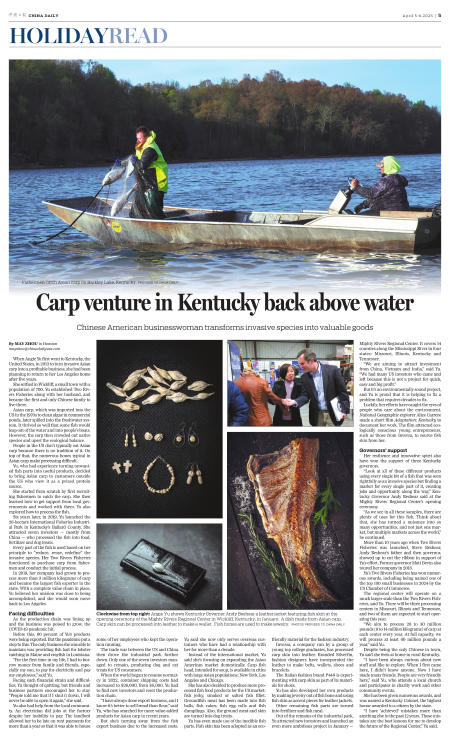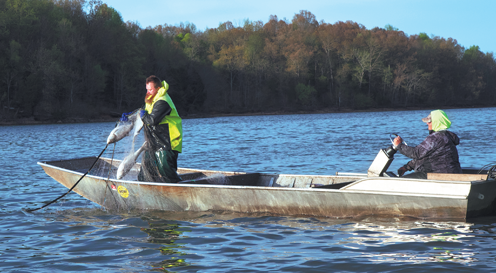
Fishermen catch Asian carp on Barkley Lake, Kentucky.
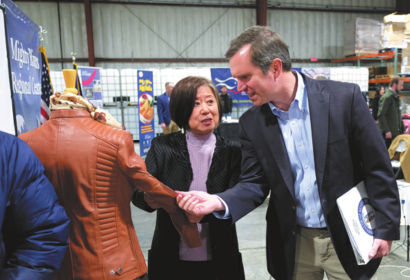
Angie Yu shows Kentucky Governor Andy Beshear a leather jacket featuring fish skin at the opening ceremony of the Mighty Rivers Regional Center in Wickliff, Kentucky, in January.
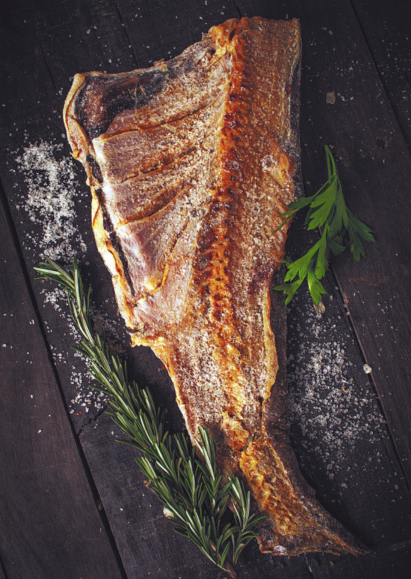
A dish made from Asian carp.
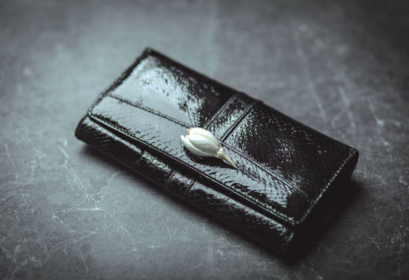
Carp skin can be processed into leather to make a wallet.
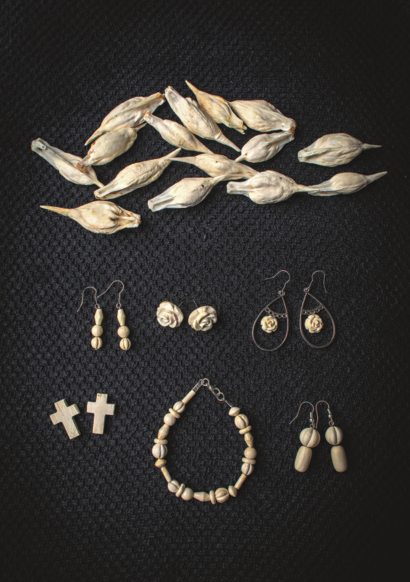
Fish bones are used to make jewelry.
When Angie Yu first went to Kentucky, the United States, in 2013 to turn invasive Asian carp into a profitable business, she had been planning to return to her Los Angeles home after five years.
She settled in Wickliff, a small town with a population of 700. Yu established Two Rivers Fisheries along with her husband, and became the first and only Chinese family to live there.
Asian carp, which was imported into the US in the 1970s to clean algae in commercial ponds, later spilled into the freshwater system. It thrived so well that some fish would leap out of the water and into people's boats. However, the carp then crowded out native species and upset the ecological balance.
People in the US don't typically eat Asian carp because there is no tradition of it. On top of that, the numerous bones typical in Asian carp make processing difficult.
Yu, who had experience turning unwanted fish parts into useful products, decided to bring Asian carp to customers outside the US who view it as a prized protein source.
She started from scratch by first recruiting fishermen to catch the carp. She then learned how to get support from local governments and worked with them. Yu also explored how to process the fish.
Six years later, in 2019, Yu launched the 26-hectare International Fisheries Industrial Park in Kentucky's Ballard County. She attracted seven investors — mostly from China — who processed the fish into food, fertilizer and dog treats.
Every part of the fish is used based on her principle to "reduce, reuse, redefine" the invasive species. Her Two Rivers Fisheries functioned to purchase carp from fishermen and conduct the initial process.
In 2019, her company had grown to process more than 3 million kilograms of carp and became the largest fish exporter in the state. With a complete value chain in place, Yu believed her mission was close to being accomplished, and she would soon move back to Los Angeles.
Facing difficulties
As the production chain was lining up and the business was poised to grow, the COVID-19 pandemic hit.
Before this, 90 percent of Yu's products were being exported. But the pandemic put a stop to this. The only business she was able to maintain was providing fish bait for lobster catching in Maine and crayfish in Louisiana.
"For the first time in my life, I had to borrow money from family and friends, especially my son, to pay for electricity and pay my employees," said Yu.
Facing such financial strain and difficulties, Yu thought of quitting, but friends and business partners encouraged her to stay. "People told me that if I shut it down, I will never be able to open it again," she said.
Yu also had help from the local community. An electrician did jobs at the factory despite her inability to pay. The landlord allowed her to be late on rent payments for more than a year so that it was able to house some of her employees who kept the operation running.
The trade war between the US and China then drove the industrial park further down. Only one of the seven investors managed to remain, producing dog and cat treats for US consumers.
When the world began to resume normalcy in 2022, container shipping costs had increased to $28,000, from $8,000. Yu had to find new investors and reset the production chain.
"I have always done export business, and I know it's better to sell bread than flour," said Yu, who has searched for more value-added products for Asian carp in recent years.
But she's turning away from the fish export business due to the increased costs. Yu said she now only serves overseas customers who have had a relationship with her for more than a decade.
Instead of the international market, Yu said she's focusing on expanding the Asian American market domestically. Carp fish head, intended for soup, is available in cities with large Asian populations; New York, Los Angeles and Chicago.
She has also decided to produce more processed fish food products for the US market: fish jerky, smoked or salted fish fillet. Groundfish meat has been made into fish balls, fish cakes, fish egg rolls and fish dumplings. Also, the ground meat and skin are turned into dog treats.
Yu has even made use of the inedible fish parts. Fish skin has been adopted as an eco-friendly material for the fashion industry.
Inversa, a company run by a group of young top college graduates, has processed carp skin into leather. Branded Silverfin, fashion designers have incorporated the leather to make belts, wallets, shoes and bracelets.
The Italian fashion brand P448 is experimenting with carp skin as part of its materials for shoes.
Yu has also developed her own products by making jewelry out of fish bone and using fish skin as accent pieces for leather jackets.
Other remaining fish parts are turned into fertilizer and fish meal.
Out of the remains of the industrial park, Yu attracted new investors and launched an even more ambitious project in January — Mighty Rivers Regional Center. It covers 14 counties along the Mississippi River in four states: Missouri, Illinois, Kentucky and Tennessee.
"We are aiming to attract investment from China, Vietnam and India," said Yu. "We had many US investors who came and left because this is not a project for quick, easy and big profit."
But it's an environmentally sound project, and Yu is proud that it is helping to fix a problem that requires decades to fix.
Luckily, her efforts have caught the eyes of people who care about the environment. National Geographic explorer Alize Carrere made a short film Adaptation: Kentucky to document her work. The film attracted ecologically conscious young entrepreneurs, such as those from Inversa, to source fish skin from her.
Governors' support
Her resilience and innovative spirit also have won the support of three Kentucky governors.
"Look at all of these different products using every single bit of a fish that was seen rightfully as an invasive species but finding a market for every single part of it, creating jobs and opportunity along the way," Kentucky Governor Andy Beshear said at the Mighty Rivers Regional Center's opening ceremony.
"As we see in all these samples, there are plenty of uses for this fish. Think about that, she has turned a nuisance into so many opportunities, and not just one market, but multiple markets across the world," he continued.
More than 10 years ago when Two Rivers Fisheries was launched, Steve Beshear, Andy Beshear's father and then governor, showed up to cut the ribbon in support of Yu's effort. Former governor Matt Bevin also toured her company in 2018.
Yu's Two Rivers Fisheries has won numerous awards, including being named one of the top 100 small businesses in 2024 by the US Chamber of Commerce.
The regional center will operate on a much larger scale than the Two Rivers Fisheries, said Yu. There will be three processing centers in Missouri, Illinois and Tennessee, and two of them are expected to start operating this year.
"We aim to process 20 to 30 million pounds (9 to 14 million kilograms) of carp at each center every year. At full capacity, we will process at least 60 million pounds a year," said Yu.
Despite being the only Chinese in town, Yu said she feels at home in rural Kentucky.
"I have been always curious about new stuff and like to explore. When I first came here, I didn't know anyone. Now I have made many friends. People are very friendly here," said Yu, who attends a local church and participates in charity work and other community events.
She has been given numerous awards, and was named a Kentucky Colonel, the highest honor awarded to a citizen by the state.
"I have 'achieved' mistakes more than anything else in the past 12 years. Those mistakes are the best lessons for me to develop the future of the Regional Center," Yu said.
mayzhou@chinadailyusa.com
